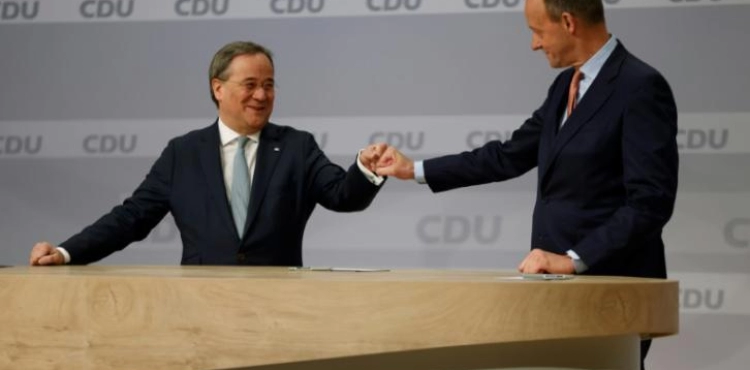The conservative German Christian Democratic Union Party chose to continue the policy of Angela Merkel, by electing Moderate Armin Laschet as its new president on Saturday, who defeated liberal Friedrich Meretz, who supports a turn to the right.
With a majority of 521 votes out of the 1001 delegates invited to cast their votes, Laschet defeated Meretz, who received 466 votes in the second round of the internal elections. It is thus in a good position to lead the conservative camp in the general elections in September, although it does not have full guarantees yet.
Commenting on his victory, Lachette said, "I want us to succeed together and to ensure that the Christian Democratic Union" reaches the chancellery in September.
Laschet, who came second after Meretz in the first round, benefited from the votes of the supporters of a third candidate, Norbert Rutgen, who supported a moderate line and who lost in the first round.
It is assumed that the results of the elections held over the Internet will be officially confirmed by mail by delegates.
Laschet, who heads the Rinania region, north of Westphalia, the largest in the country in terms of population, had received indirect support from Merkel, who hinted on Friday evening at the opening of the party conference that she prefers to follow a "middle" path and refuses to polarize.
These elections are crucial for Germany´s future, with the approaching legislative elections scheduled for late September and the end of the Merkel era, who has ruled since 2005.
The right and center-right candidate for the chancellery will be chosen in the spring, while there are other candidates at a time when the second wave of the Covid-19 epidemic is hitting Germany hard.
For the first time since 2000, a woman will not head the Christian Democratic Union.
Merkel´s "successor", Annegret Kramp-Karenbauer, took over the party leadership in 2018 before resigning in early 2020 because she was unable to impose herself.
The personalities of the candidates for this election differ widely.
Frederick Meretz, the archenemy of the Chancellor, since his removal from the presidency of the conservative bloc in the House of Representatives (Bundestag) in 2002, dreamed of revenge, but his ambition was not fulfilled.
A businessman who was defeated by a slight margin by Kramp Karenbauer in 2018 and who has hard-line stances on immigration that attracts voters aligned with the far right, can continue to pressure the Christian Democratic Union in the future given the good result it achieved despite not winning.
In its Saturday speech, the Christian Democratic Union called on not to search for "compromise" at any cost.
This former lawyer faces criticism, as he does not exercise any official job, his provocative statements, his highly-paid job at Blackrock Asset Management, and his verbal lapses are all points that harm his image.
Armin Laschet, 59, has many strengths. This moderate former journalist follows in the footsteps of the popular German chancellor.
In a speech on Friday evening, Merkel hinted that she prefers the "team" that he forms with Health Minister Jens Young.
Laschet may appeal to centrist voters. If he runs in September, he may be able to build a potential alliance with the Green Party, the second-largest power in the country.
In his Saturday speech, Laschet praised the chancellor, stating that when she came to power in 2005, Germany had been "Europe´s patient", while he, too, wanted to run for the position.
Lachette won despite the fact that the way he managed the epidemic crisis in his region was criticized, especially against the backdrop of his call for easing restrictions in the spring, despite the opinions of experts against that.
The majority of delegates who voted received the support of Rotgen, an expert in international relations and who promised to renew the party and "feminize" it.
On the issue of running for the chancellery, Marcus Söder, the leader of the Christian Social Union, the sister party of the Christian Democratic Union, remains high.
Söder has become a favorite among Germans by calling for strict restrictions in the face of the epidemic.
Despite his denial of this, the man who has succeeded in achieving a political repositioning in the past two years dreams that he will be invited by the Christian Democratic Union to take the lead after a series of local elections in mid-March, and by this he may become the first counselor belonging to the Christian Social Union.












